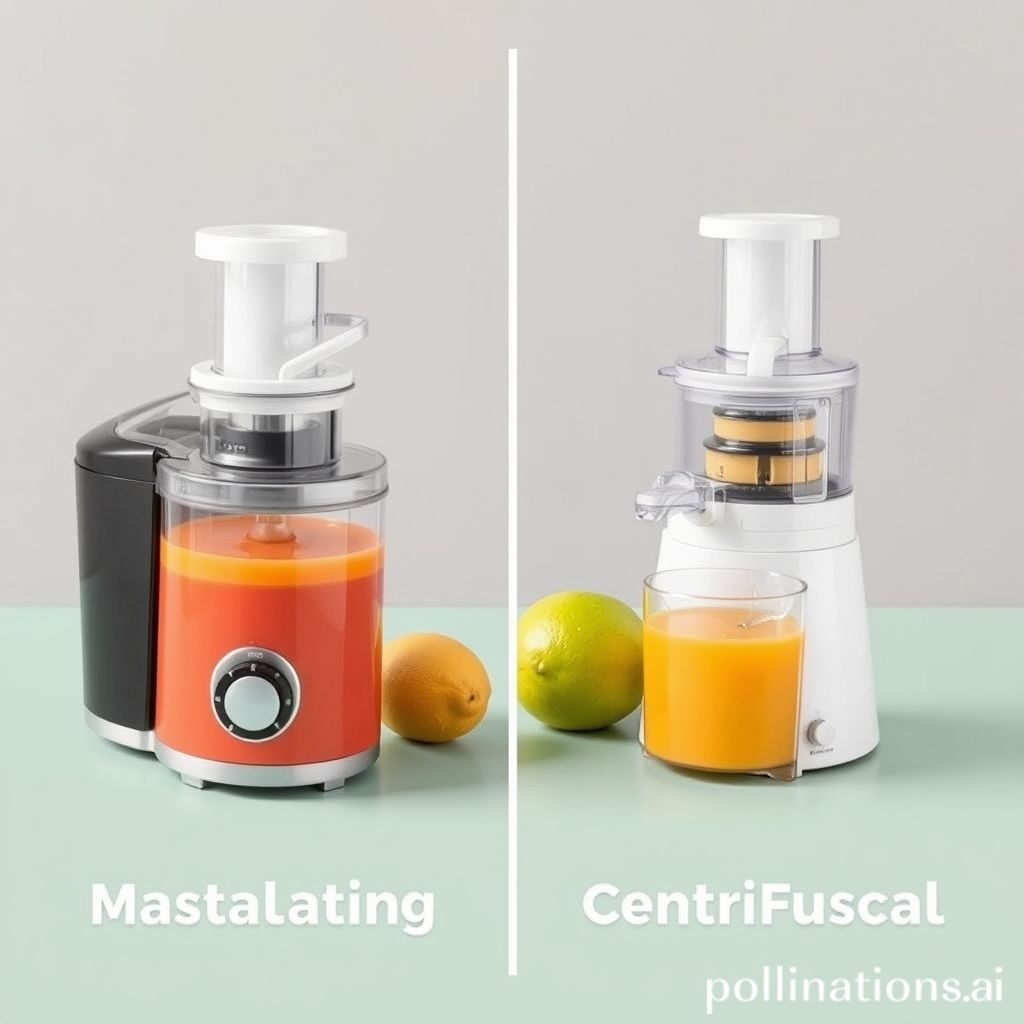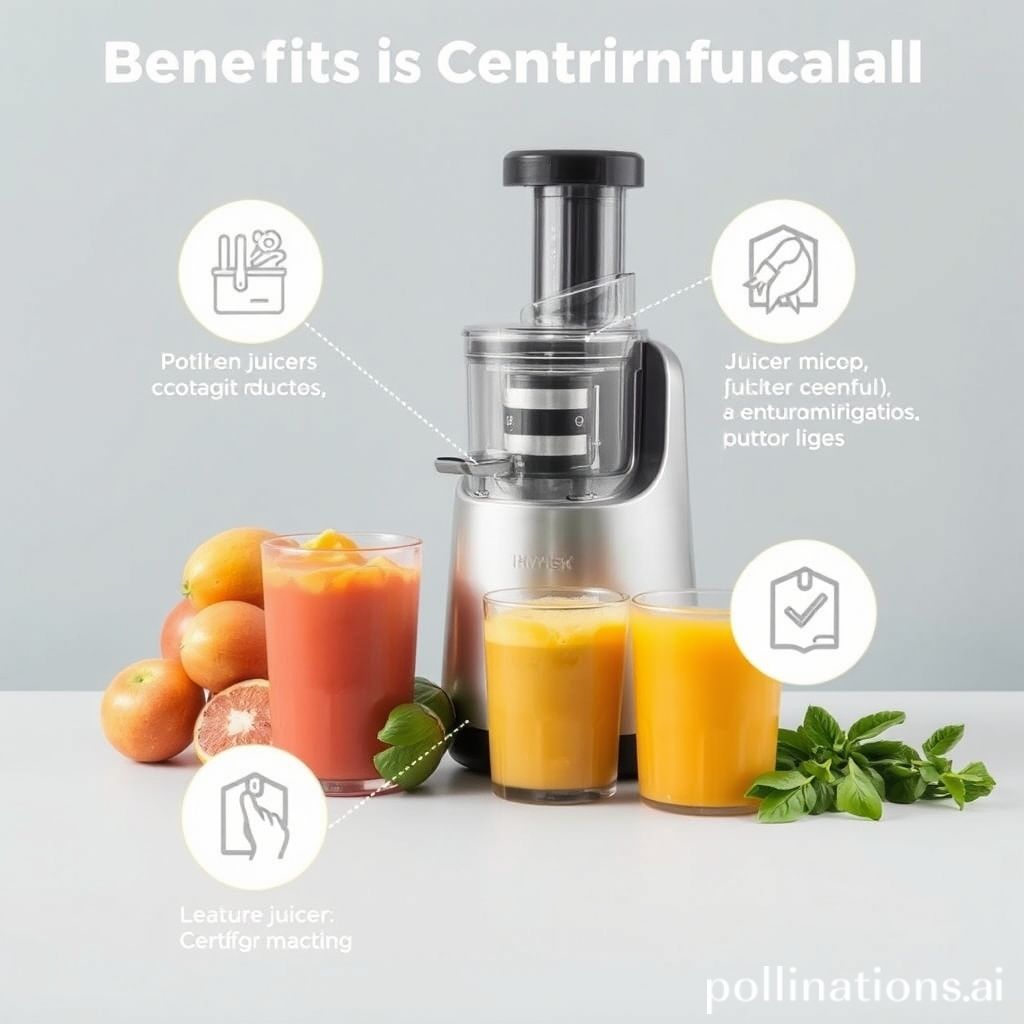Which Juicer Is Better Masticating Or Centrifugal?
[su_note note_color=”#fb8e00″ text_color=”#000000″ radius=”12″]
Juicers are essential kitchen appliances for those who enjoy fresh, homemade juice. In regard to choosing the right juicer, many people are torn between a masticating juicer and a centrifugal juicer.
Both types have their advantages and disadvantages, and understanding these differences is crucial in making an informed decision. This article will delve into the distinctions between masticating and centrifugal juicers, helping you determine which one is the better option for you. Whether you prioritize juice yield, ease of use, or nutritional value, this guide will provide you with all the necessary information to make the right choice.
[su_box title=”
[/su_box]

Benefits of Masticating Juicers
1. Slow and Gentle Juicing Process
Masticating juicers operate at a slower speed compared to centrifugal juicers. This slow and gentle process helps to preserve the natural enzymes and nutrients present in fruits and vegetables. By minimizing oxidation and heat generation, masticating juicers ensure that the juice retains its nutritional value, resulting in a healthier beverage.
2. Better Nutrient Retention
One of the main advantages of masticating juicers is their ability to extract a higher amount of nutrients from produce. These juicers efficiently chew and grind fruits and vegetables, breaking down cell walls and releasing more vitamins, minerals, and antioxidants. As a result, you can enjoy a juice rich in nutrients that promotes overall well-being.
3. Ability to Juice a Wide Variety of Ingredients
Masticating juicers excel at processing various ingredients, including leafy greens, wheatgrass, and herbs. Their powerful auger and slow speed allow them to extract juice from fibrous and delicate ingredients with ease. Whether you desire a refreshing green juice or a vibrant beetroot blend, a masticating juicer can handle it all.
4. Longer Shelf Life of Juice
If you prefer to prepare your juice in advance or store it for later consumption, masticating juicers offer an advantage. The slow juicing process minimizes the exposure of the juice to air, reducing oxidation and extending its shelf life. This means you can enjoy your homemade juice for up to 72 hours without compromising its flavor and nutritional quality.
[su_highlight background=”#f6b40f”]Expert Tips: Slow and gentle juicing process preserves nutrients. Masticating juicers extract more nutrients from produce. They can juice a wide variety of ingredients. Juice made with masticating juicers has a longer shelf life.[/su_highlight]
Disadvantages of Masticating Juicers
1. Slower Juicing Process
Masticating juicers operate at a slower speed compared to centrifugal juicers. This slower process has its benefits, such as preserving more nutrients and minimizing oxidation. In contrast, it also means that juicing can take longer. It’s important to consider your time constraints when choosing a juicer.
2. Higher Price Range
Masticating juicers tend to be more expensive than centrifugal juicers. This is primarily due to their advanced technology and additional features. If you have a limited budget, a masticating juicer might not be the most cost-effective option for you.
3. Bulkier and Heavier Design
Masticating juicers are known for their robust build and heavy-duty construction. Meanwhile this durability can be an advantage, it also means that these juicers are bulkier and heavier compared to centrifugal juicers. If you have limited counter space or need a portable juicer, the size and weight of a masticating juicer may not be ideal for you.
| Disadvantage | Description |
|---|---|
| Slower Juicing Process | Masticating juicers operate at a slower speed, resulting in a longer juicing process. |
| Higher Price Range | Masticating juicers are generally more expensive than centrifugal juicers due to their advanced technology and additional features. |
| Bulkier and Heavier Design | Masticating juicers have a robust build, making them bulkier and heavier compared to centrifugal juicers. |
Advantages of Centrifugal Juicers
1. Faster Juice Extraction
One major benefit of centrifugal juicers is their ability to extract juice quickly. The high-speed spinning blade effectively breaks down fruits and vegetables, resulting in a faster juicing process compared to masticating juicers. This makes centrifugal juicers a great choice for busy individuals or those who value convenience.
2. More Affordable Price Range
Centrifugal juicers are generally more budget-friendly compared to masticating juicers. Their simpler design and construction contribute to a lower price point, making them a more accessible option for individuals who want to buy a juicer without spending too much. This affordability factor makes centrifugal juicers an attractive choice for beginners or those with a limited budget.
3. Compact and Lightweight Design
If you have limited counter space or need to frequently move your juicer around, a centrifugal juicer is a great option. These juicers are known for their compact and lightweight design, making them easy to store and transport. Whether you have a small kitchen or prefer a portable juicer for travel, the compactness and lightness of centrifugal juicers provide added convenience.

Disadvantages of Centrifugal Juicers
1. Inefficiency in extracting juice from leafy greens
One drawback of centrifugal juicers is their inefficiency in extracting juice from leafy greens. Leafy greens such as kale, spinach, and wheatgrass require a slower and gentler juicing process to maximize juice extraction. Centrifugal juicers, with their high-speed spinning blades, may not effectively extract juice from these ingredients, resulting in lower juice yield.
2. Increased heat generation leading to nutrient loss
Another disadvantage of centrifugal juicers is the higher heat generation during the juicing process. The high-speed spinning blades create friction, generating heat. This heat can impact the quality and nutritional value of the juice. Heat-sensitive nutrients like enzymes, vitamins, and antioxidants may be compromised or destroyed, reducing the overall nutritional benefits of the juice.
3. Limited shelf life of juice
Centrifugal juicers produce juice with a shorter shelf life compared to juice extracted using other methods. The high-speed spinning blades introduce more air into the juice, causing oxidation. Oxidation can accelerate spoilage and lead to a loss of freshness and nutritional value. If you prefer to make juice in advance or store it for longer periods, a centrifugal juicer may not be the optimal choice.
| Disadvantage | Description |
|---|---|
| 1. Inefficiency in extracting juice from leafy greens | Centrifugal juicers are not as effective in extracting juice from leafy greens like kale, spinach, and wheatgrass. |
| 2. Increased heat generation leading to nutrient loss | The high-speed spinning blades of centrifugal juicers generate heat, resulting in the loss of heat-sensitive nutrients. |
| 3. Limited shelf life of juice | Due to the introduction of more air during the juicing process, centrifugal juicers produce juice with a shorter shelf life. |
[su_note note_color=”#ea2e0c” text_color=”#ffffff” radius=”8″]Extra Tips: Consider a masticating juicer for better extraction of juice from leafy greens, minimal nutrient loss, and longer shelf life.[/su_note]
Factors to Consider When Choosing Between Masticating and Centrifugal Juicers
1. Juicing Goals and Preferences
When deciding between a masticating and a centrifugal juicer, it’s important to consider your goals and preferences for juicing. Masticating juicers can extract juice from a wide range of produce, including leafy greens and wheatgrass. They operate at a slower speed, preserving the enzymes and nutrients in the juice. In contradistinction, centrifugal juicers are faster and better suited for hard fruits and vegetables like apples and carrots. They are also generally more affordable.
2. Budget and Price Range
Another important factor to consider is your budget and price range. Masticating juicers are typically more expensive than centrifugal juicers due to their advanced technology and higher juice yield. Albeit, if you are a serious juicer and value the quality and nutritional value of your juice, investing in a masticating juicer may be worth the extra cost. If you are on a tight budget or just starting out with juicing, a centrifugal juicer could be a more affordable option.
3. Frequency of Juicing and Time Constraints
Your frequency of juicing and time constraints should also be taken into account. Masticating juicers are slower and require more time to extract juice compared to centrifugal juicers. If you have limited time in the mornings or prefer to juice in large batches for the whole day, a centrifugal juicer may be more suitable. Albeit, if you have the time to spare and enjoy a slower, more hands-on juicing experience, a masticating juicer can provide you with a higher quality juice.
4. Noise Level and Ease of Cleaning
Noise level and ease of cleaning are practical considerations when choosing a juicer. Centrifugal juicers tend to be noisier due to their high-speed spinning blades. If you live in an apartment or have noise-sensitive family members, a masticating juicer may be a better choice. Additionally, cleaning a juicer can be time-consuming. Centrifugal juicers are generally easier to clean, as they have fewer parts and are dishwasher-safe. Masticating juicers, with their more complex design, may require more effort and time for cleaning.
Conclusion
Selecting the best juicer ultimately depends on individual needs and preferences. Whether you choose a masticating juicer or a centrifugal juicer, both have their own advantages and drawbacks.
Masticating juicers are known for their ability to retain more nutrients and produce higher-quality juice, At the same time centrifugal juicers are faster and more convenient. Consider factors such as budget, juicing goals, and time constraints when making your decision. By Mastering the differences between these two types of juicers, you can make an informed choice that suits your lifestyle and ensures a satisfying juicing experience.
Faq about Masticating and Centrifugal Juicers
FAQ 1: Are masticating juicers more expensive than centrifugal juicers?
Masticating juicers tend to be more expensive than centrifugal juicers. This is because masticating juicers use a slower, more efficient process to extract juice, resulting in higher quality juice and a higher price point.
FAQ 2: Can centrifugal juicers extract juice from leafy greens?
Yes, centrifugal juicers can extract juice from leafy greens. That being said, it is important to note that centrifugal juicers may not be as effective at extracting the maximum amount of juice from leafy greens compared to masticating juicers.
FAQ 3: Do masticating juicers produce less heat during the juicing process?
Yes, masticating juicers produce less heat during the juicing process compared to centrifugal juicers. The slower and more gentle squeezing action of masticating juicers helps to minimize heat production, which is beneficial for preserving the nutritional value and enzymes in the juice.
FAQ 4: How long can the juice from a masticating juicer be stored?
The juice from a masticating juicer can be stored for up to 72 hours when stored in an airtight container in the refrigerator. The slower juicing process of masticating juicers helps to minimize oxidation, allowing the juice to retain its freshness and nutritional value for a longer period.
FAQ 5: Which type of juicer is easier to clean?
Masticating juicers are generally easier to clean compared to centrifugal juicers. The design of masticating juicers involves fewer parts and simpler assembly, making them easier to disassemble, clean, and reassemble. Additionally, the slower juicing process of masticating juicers results in less pulp build-up, further simplifying the cleaning process.
Read Similar Post:
1. Is Hurom a Masticating Juicer? Find Out How It Extracts Juice Naturally
2. Jason Vale’s Preferred Juicer: Unveiling the Expert’s Top Recommendation
